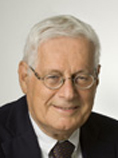In March, the 68th Commission on the Status of Women (CSW68) convened in…
Staff John L. Hirsch
John L. Hirsch is currently a Senior Adviser after having held various positions at IPI, including Vice President and Acting Head of the Africa Program. He is also Adjunct Professor at Columbia University's School of International and Public Affairs (SIPA) and served as Director of the Occidental College United Nations Program from 2002-2011.
Before joining IPI, Ambassador Hirsch served as United States Ambassador to the Republic of Sierra Leone from 1995-1998. His extensive African experience includes assignments in Somalia from 1984-1986, and subsequent roles as Political Adviser to the Commander of UNITAF, General Robert Johnston, and as Deputy to President Bush's Special Envoy, Ambassador Robert Oakley from 1992-1993.
Ambassador Hirsch served as Consul General in Johannesburg, South Africa from 1990-1993, the years of transition from apartheid to non-racial multiparty democracy. His earlier assignments in Israel at the start of the Middle East peace process in the mid-seventies and, subsequently, at the US Mission to the United Nations and in Pakistan have dealt with major issues of multilateral diplomacy and United Nations peacekeeping.
Ambassador Hirsch was a Senior Fellow at the Council on Foreign Relations in 1993 and 1994 and Diplomat-in-Residence at Medgar Evers College, City University of New York, from 1994-1995. He was Director of the International Fellows Program at Columbia University's School of International and Public Affairs for the 2000-01 academic year.
Ambassador Hirsch received his BA in American studies from Columbia University in 1957 and his PhD in European history from the University of Wisconsin in 1965. He was a Fulbright Scholar in Turin, Italy, in 1962 and 1963, where he wrote a dissertation on the Italian Resistance Movement and its impact on postwar Italian political developments.
His publications include Sierra Leone: Diamonds and the Struggle for Democracy (Lynne Rienner, 2001) and Somalia and Operation Restore Hope: Reflections on Peacemaking and Peacekeeping, co-authored with Ambassador Robert B. Oakley (US Institute of Peace, March 1995). His chapter “Peace and Justice: Mozambique and Sierra Leone Compared” appeared in Peace versus Justice? The Dilemmas of Transitional Justice in Africa, edited by Chandra Lekha Sriram and Suren Pillay (Durban: University of KwaZulu-Natal Press, 2009).
Global Observatory:
- “Contrasting Trends: Europe Between Democracy and Radicalism,” February 6, 2015.
- “The Search for Federal Solutions,” August 20, 2014.
- “Can the ICC and Africa Mend a Rocky Relationship?,” May 14, 2014.
- “Sierra Leone Reaps Benefits of Kabbah’s Persistent Quest for Peace,” April 29, 2014.
- “How Mandela’s Relentless Diplomacy Transformed South Africa,” December 9, 2013.
- “Twenty Years After Black Hawk Down, What Lessons Have Been Learned?” October 3, 2013.
- “Challenges Ahead After Mali’s Elections,” August 8, 2013.
- “Somalia: From Transition to Transformation,” August 9, 2012.
- “London Conference on Somalia: New Roadmap, Old Concerns,” February 29, 2012.
- “With New Efforts, International Community Tries Again With Somalia,” February 14, 2012.
- “Secretary-General Ban Ki-moon’s Visit to Mogadishu,” December 12, 2011.
- “The Fate of Dictators,” November 1, 2011.








